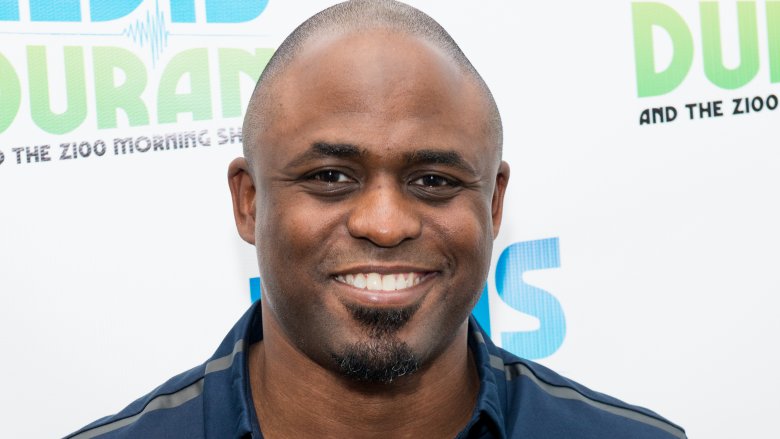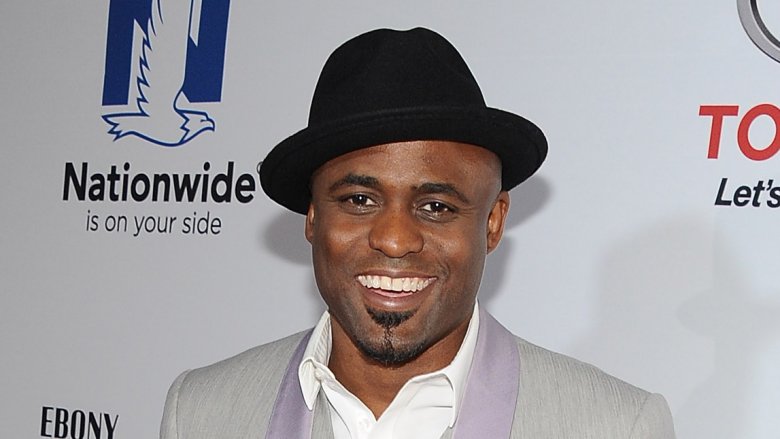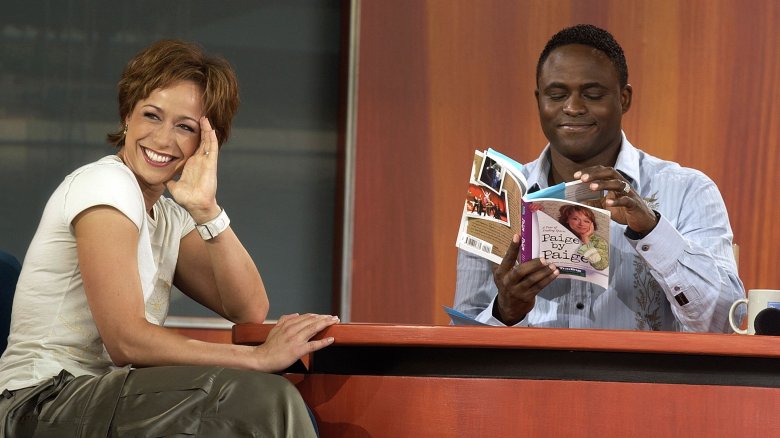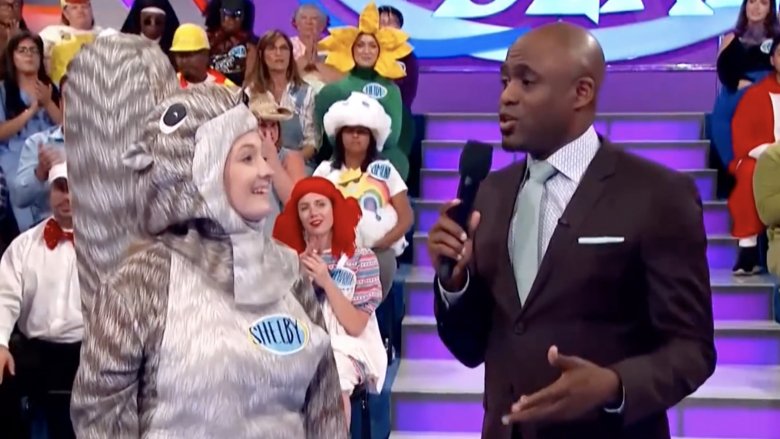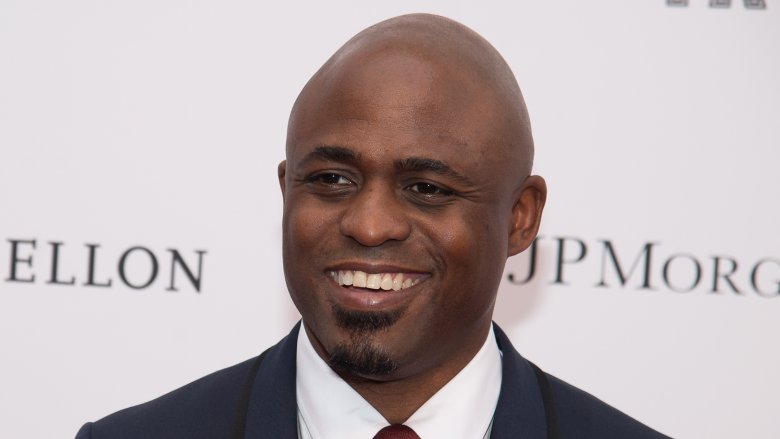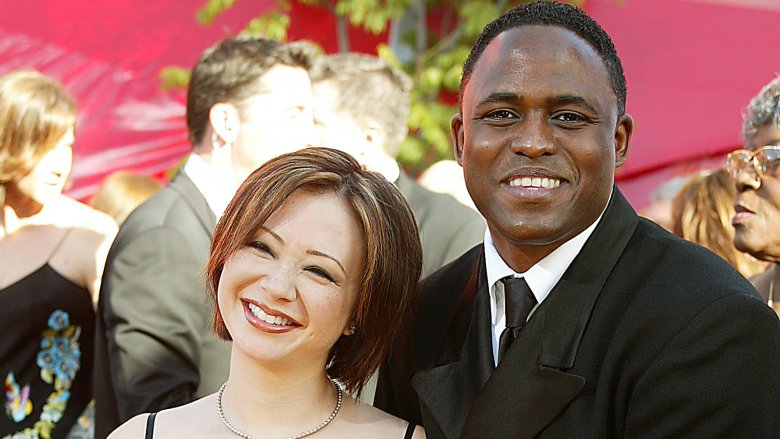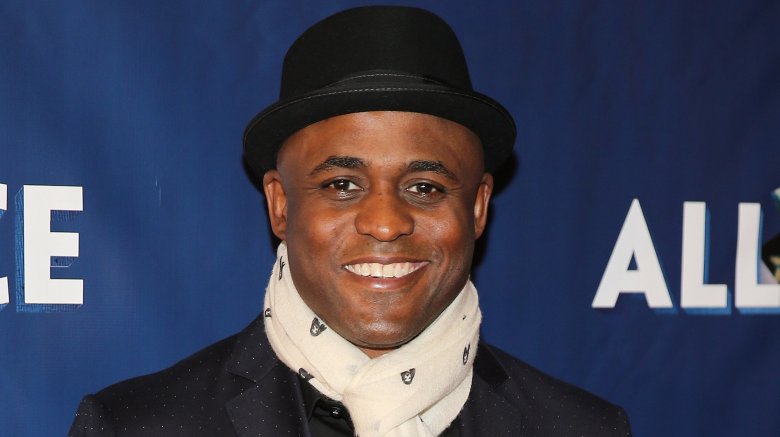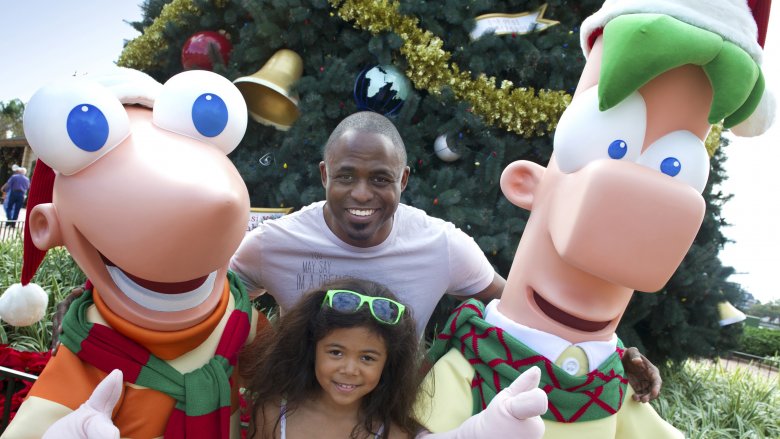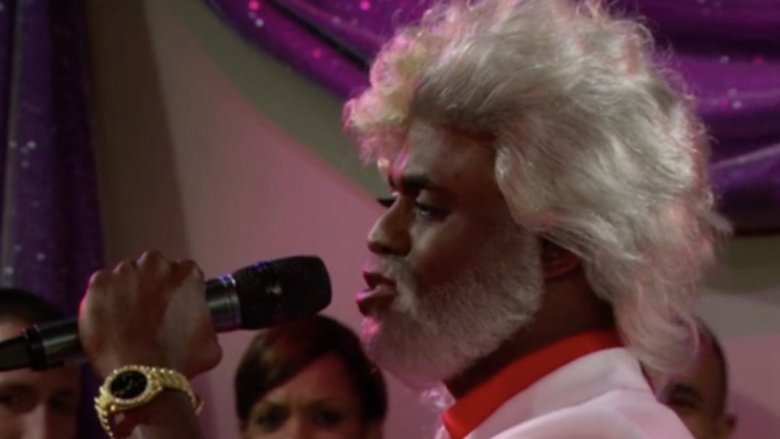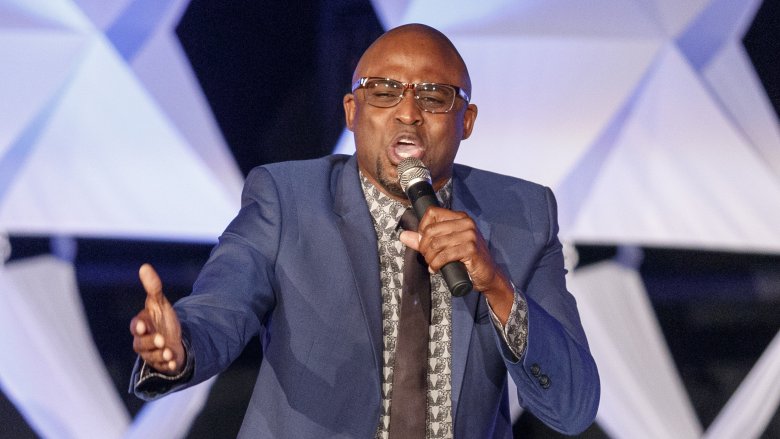Wayne Brady: The Real Reason You Don't Hear From Him Anymore
When Wayne Brady burst onto the scene in the late 1990s, he was a refreshing change of pace from the usual kind of entertainer. That's because he felt like a guy from another era, a performer who could do it all — he could act, he could sing, he could dance, he could do improv (like on ABC's Whose Line is It Anyway?), and he could host things. You liked him, and so did your mom and your grandma. Also, he was super handsome and bursting with charm and likability. The world of entertainment was his for the taking.
But Hollywood in the late '90s and early 2000s never quite knew what to do with the man who had so many talents, tough as he was to peg to any one thing. As a result, he doesn't show up on primetime TV or in majorly high-profile gigs as much anymore. Here's what Wayne Brady has been up to ... apart from probably smiling politely and waving when somebody repeats his self-effacing Chappelle's Show bit to him for the hundredth time that day.
The Wayne Brady Show flopped...
A throwback to the era of vaudeville, or the Broadway-bound "triple threats" who could sing, dance, and act, Wayne Brady was so astonishingly talented across so many different disciplines that, ironically, the millennium-era TV and movie industry didn't have an existing project — or genre of project — in which it could slip the guy. So, in the summer of 2001, ABC created The Wayne Brady Show, an attempt to revive TV variety.
A staple of TV in the '60s and especially the '70s, programs like The Carol Burnett Show offered a little bit of sketch comedy, a big song-and-dance number or two, and some interplay with a celebrity guest. In other words, a way to incorporate the talents of someone like Wayne Brady. But alas, a hokey throwback of a passé form of entertainment was still a hokey throwback of a passé form of entertainment, even when it starred the likable, funny, and musical dude from Whose Line is it Anyway? Two seasons of The Wayne Brady Show aired in the summer of 2001 and the spring of 2002 to low ratings, and ABC canceled it.
...and then The Wayne Brady Show flopped again
However, The Wayne Brady Show was revived in syndication ... in name only. When it re-emerged on local stations in afternoon time slots in the fall of 2002, the series was a bright and sunny, celebrity-guest-type talk show — more like Ellen or The Rosie O'Donnell Show than Jerry Springer or Maury. Despite The Wayne Brady Show winning Outstanding Talk Show at the Daytime Emmy Awards, and Brady taking home the Emmy for Outstanding Talk Show Host twice, distributor Buena Vista Television pulled the plug after two seasons in 2004.
Why did it fizzle out? Brady told BET that there was some disagreement with executives on what kind of show it should have been. "ABC wanted me to be the traditional talk show host, but I really wanted to talk about the things that I liked. I'm a hip-hop fan, I love the culture and I grew up in it. That was something I was never allowed to express and that's why I think this mostly lop-sided view of what I did on TV emerged. I wasn't able to really be me," Brady said.
He's a 'Deal' maker
While it may seem to you like Wayne Brady has inexplicably disappeared from the public sphere, that might be because you've worked a 9-to-5 job for years, and/or you haven't stayed home sick in a while. If you did, then you'd know that Brady has a relatively high-profile and extremely plum gig in daytime television. Since 2009, he's hosted Let's Make a Deal on CBS. It's one of only two network game shows, alongside The Price is Right, and oddly enough, both shows are hosted by former cast members of ABC's late '90s improv show Whose Line is It Anyway? — Drew Carey and Wayne Brady.
So if you're missing Wayne Brady, turn on the TV if you're at home some afternoon, and you'll see him help excitable people in silly costumes try to win cash and prizes by guessing what's behind door number three (or trading it for "what's in the box") in this long-running revival of the classic game show, following in the footsteps of the great Monty Hall.
Is race a factor?
Wayne Brady is an African-American man. That doesn't really have anything to do with anything in terms of Brady's talents and work history, but Brady believes that his race has both positively and negatively affected his career.
In 2013, he told BET that being a Black man has worked to his "advantage and to [his] detriment depending on the project." He thinks that his ability to excel in so many different kinds of things negatively affects perceptions of him. "Most people in life like things handed to them on a very digestible, easily deciphered platform. But from the time I was a child, I refused to fit into a little box," Brady said.
He has to live with a tenuous peace and just be as pleased as he can with the work. "I can't make everybody happy. I'll either be too white for the people who don't watch the game show, I'll be too Black for people who see my live improv shows, or I won't be manly enough for the dude who is a thug." Dang, why can't Wayne Brady win?
He fought depression and won
Brady has endured some personal struggles. And while those may not affect whether or not he gets cast in things, they certainly affect his ability to work. In 2014, the seemingly sunny multi-hyphenate told Entertainment Tonight that for years he'd been quietly and secretly battling depression. "People are like, 'Wayne Brady's always happy!'" he said. "No, I'm not. Because I'm human."
Brady said that his battle with mental illness began as it did for many others — by having an unrelenting string of bad days which turned into wallowing which turned into what Brady said felt like he deserved it because he thought he was "that horrible of a person."
Brady said things got as bad as they ever would on his 42nd birthday in June 2014. "I was there by myself, in my bedroom, and I had a complete breakdown," he told ET. "That birthday was the beginning of, 'OK, I've got to make a change.'" The shocking suicide of Robin Williams a couple of months later also deeply affected Brady and made him want to get better. He was soon on his way to recovery, and he's credited his success to the help and support of his ex-wife, Mandie Taketa, whom he divorced in 2007. Glad you're doing better, man.
He was in the room where it happens
The one place where Wayne Brady will always have a job, albeit a less widely visible one because it costs a small fortune to see him there, is the stage. As a guy who can sing, act, and charm a crowd, he's a natural for starring in big, Broadway-style musicals. In 2017, he landed one of the most coveted roles in theater as the complicated narrator/bad guy Aaron Burr in the Chicago run of the extremely popular musical Hamilton. Leslie Odom, Jr. originated the role on Broadway and won a Tony Award for his efforts, so Brady had his work cut out for him. Fortunately, he passed the test, earning raving reviews. Steven Oxman of Variety said Brady navigated the role with agility, calling his take on Burr "shallow and emotionally impervious" as well as "cool and calculating."
In addition to the Windy City theater scene, Brady has graced the Great White Way itself. In 2004, he had a stint as sleazy lawyer Billy Flynn in the long-running Broadway production of Chicago, and he's subbed in as Lola in Kinky Boots two separate times for a few months each.
Listen to this!
Brady possesses the crisp diction of a highly-trained actor, but he can also project and sing like the seasoned theatrical veteran that he is. And Brady has put those pipes to use. So while you might not see him around, if you listen closely, you just might hear him.
Since getting his first voice credit in 1994 on the video game adaptation of the Nickelodeon game show GUTS, Brady has enjoyed a career as a voiceover artist. He's portrayed all sorts of people, animals, and other things, like Micron on Batman Beyond, a ferret in Clifford's Big Movie, a rabbit on Sofia the First, Harold McBride on The Loud House, and various characters on American Dad, Phineas and Ferb, and TripTank.
Because Brady so easily jumps from one entertainment sector to another, he's also released a couple of albums. His well-titled 2008 debut A Long Time Coming featured a mix of R&B originals Brady co-wrote, along with covers of Sam Cooke's "A Change is Gonna Come" and the Beatles' "Can't Buy Me Love." His follow-up was much different: a kid's album for Disney called Radio Wayne. (He took decidedly pro-manners and pro-reading stances on songs like "Say Please" and "Reading Can Be Fun," respectively.)
He's on your favorite show
Wayne Brady is an actor by trade and by passion, and it's how he pays the bills. So while he might be between starring gigs at the moment, he's worked consistently as a television series guest star. He had a memorable stint on 30 Rock as a man named Steven Black, whom Liz Lemon (Tina Fey) dated to prove she wasn't racist, he played a heightened version of himself on nine episodes of the reality spoof Real Husbands of Hollywood, and he broke out of his comedy safe zone for an arc on the cult sci-fi series Colony. Easily Brady's most notable and famous TV work post-Whose Line is It Anyway? was a recurring role on How I Met Your Mother as James Stinson, the equally roguish brother of Neil Patrick Harris' Barney. (That show ended in 2014, so alas, Brady shall "suit up" no more.)
He's out there on the road
So what's Wayne Brady up to these days? Rather than make a big TV show, put it out there, and wait for people to find it in the incredibly crowded TV climate, Brady hits the road, bringing his talents directly to his biggest and most devoted fans. When he has a couple of days off from his Let's Make a Deal shooting schedule, he takes his traveling nightclub act to Las Vegas, as well as to various high-end casinos and theaters around the United States. The evening with Wayne Brady is a big and entertaining showbiz spectacle, containing a little bit of all of the different things that Wayne Brady does maddeningly well. He sings a few songs, he dances a bit, he does a little comedy, and he even does some Whose Line-style improv comedy, which has to be hard when there's just one person on the stage.

